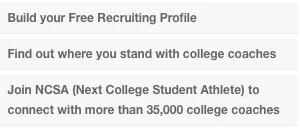2013 NCAA Convention: IPP Focus on Data
The Institutional Performance Program, the successor to the NCAA certification program, is as wildly different from its predecessor as just about any program in NCAA history. The old program was a once-every-ten-years process where athletic departments received what amounted to an accreditation. It was a time consuming and infrequent process.
The IPP will at the start, require no additional information or work from campuses, and is designed to deliver usable data to institutions annually. Using existing data that schools report to the NCAA, the national office will compile the raw data and compile it for institutions. Schools will also see how they compare to the rest of the conference as well as nationally. If new data is needed, the goal is to integrate the collection of that data into existing processes.
Accountability measures are still being discussed, but could include requiring institutions that underperform to produce remediation plans or peer expert visits. Those measures would be triggered by not meeting either national minimum benchmarks or aspirational goals for each institution. But no accountability measures would be implemented without adequate notice to the membership, which means 2015 or 2016 at the earliest.
The debate over accountability measures came up in the Q&A. The program will kick off without any sort of punishment or sanctions. The idea is for schools to see the data first before the membership decides on accountability measures. That has lead to fears about the program being very far along with little opportunity to debate or change the accountability measures that are eventually proposed, along with concerns over specific types of corrective measures or penalties.
William Perry, president of Eastern Illinois University, spoke to how presidential decision-making is getting more data driven, partially as a reaction to the changing membership of university governing boards. The Association of Governing Boards is getting more powerful and boards have more members with a business background. On the other hand, Michigan State athletic director Mark Hollis warned against relying solely on comparative dashboards to make decisions simply to keep up with the Joneses.
Focusing more on academic data, David Clough, faculty althletics representative at Colorado discussed the presentation of data. One particularly effective way to communicate is through the creative and judicious application of color. Clough also mentioned not using data to just hit minimum standards, but also to build safety margins, like the APR score necessary to weather a coaching change with no penalties.


